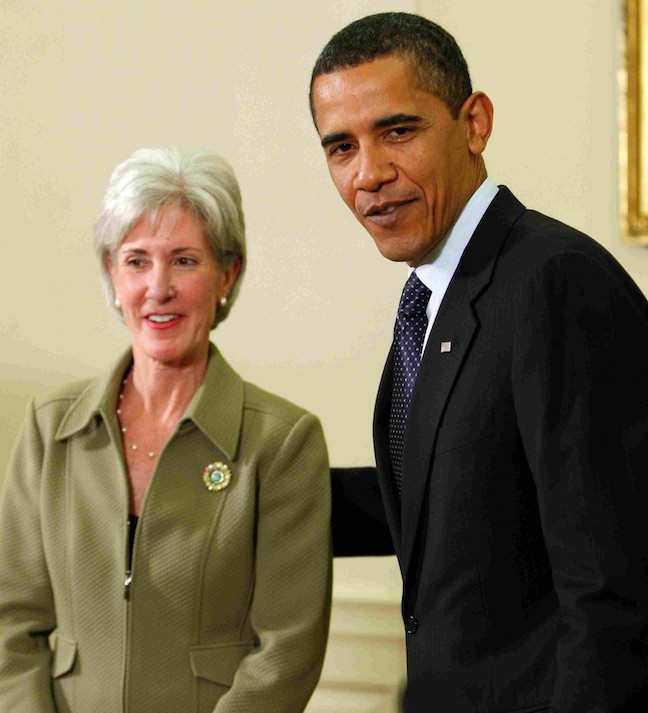President Barack Obama’s nomination of Kathleen Sebelius to be Secretary of Health and Human Services was, in several respects, no surprise. As a seasoned and successful Kansas politician, she is thoroughly familiar with the substance of federal health and welfare programs. The same cannot be said of her familiarity with the teachings of the Catholic Church, of which she professes to be a member in good standing. Her appalling public record on abortion (including political support for partial-birth abortion and financial support from the notorious late-term abortionist Dr. George Tiller, whom she hosted at the Kansas governor’s mansion) has made her a hero to Planned Parenthood, NOW, and NARAL – all good endorsements for high office in the Obama administration.
What makes her attractive to the pro-abortion crowd, however, constitutes a scandal to the faithful. Governor Sebelius, of course, denies that there is any conflict between her public support for abortion and her private views, which, she says, are opposed to abortion. Her sophistry on this point wouldn’t pass muster for five minutes in a high school philosophy class. And it certainly hasn’t passed muster with her ordinary, Archbishop Joseph Naumann of Kansas City, Kansas, who privately counseled Governor Sebelius and, when she proved deaf to his pastoral instruction, requested that she not present herself for Communion. What she will do about this when she gets to Washington remains to be seen, but it would add another scandal of massive proportions if Washington’s Archbishop Wuerl were to undercut, even by passivity, Archbishop Naumann’s considered and publicly declared judgment.
Archbishop Naumann’s defense of Catholic moral teaching is a bracing reminder that membership in the Church carries with it obligations that are not a matter for subjective judgment. Governor Sebelius is perfectly free to follow her conscience into the Church of My Opinions Above All, but that is not what she wants. She wants the psychological comfort (and one supposes, the cultural and political benefits) of calling herself a Catholic even as she rejects the Church’s carefully articulated teaching on the duties of public officials.

In this, Sebelius is hardly alone. Shortly after the White House nominated her, more than two dozen Catholic academics signed a joint letter of support. Of course, she has chosen to reject the Church teaching in favor of the by now threadbare “I’m personally opposed, but…” ruse. This much-invoked mantra originated among a group of modernist theologians who contrived the casuistry initially for the political benefit of Senator Edward Kennedy in the 1970s. Over the next few years, it gradually acquired a superficial plausibility, but in the mid-eighties, Governor Mario Cuomo of New York made it into an ex cathedra instruction for wobbly Catholic politicians. In a much ballyhooed address at the University of Notre Dame, Cuomo elaborated a full bells-and-whistles brief for cafeteria Catholicism.
The sainted Henry Hyde also traveled to Notre Dame and tore up Cuomo’s sophistries root and branch. But Catholic politicians like Hyde are a rare breed. During his long and illustrious career in the House of Representatives, his wonderfully well-formed Catholic intellect and conscience had a huge impact, not only on public policy but on many of his colleagues. Most politicians, alas, aren’t much interested in arguments from principle, and fewer still are prepared to sacrifice short-term self-interest for what they consider to be the hindrance of a moral abstraction. Hyde won the argument, but Cuomo carried the day.
The Kennedy-Cuomo rationale received considerable support from a related line of argument advanced by a number of prominent American bishops. This took the form of the so-called “seamless garment” thesis, which declared that it was unfair to judge Catholic politicians primarily by their stance on abortion. Church social teaching covers many subjects, so politicians were to be judged across the entire spectrum of public policy issues – as if how one voted on welfare benefits or arms control policy was the moral equivalent of voting to support the intentional killing of innocent unborn children. Whatever its intentions, the operative effect of the seamless garment was to give moral cover to Catholic politicians espousing the pro-abortion line.
Twenty years on, the results are painfully apparent. Is there even one Catholic politician of national prominence today whose opinions and actions comport with Church teaching? Meanwhile, the list of prominent politicians who contrive endless sophistries to avoid their clear moral obligations grows longer and longer. Kathleen Sebelius is only the latest arrival on the Washington scene, where, alas, she will receive consolation and further artful instruction from theologians such as Ted Kennedy, John Kerry, Nancy Pelosi, and Joe Biden.
Never before in American history has the teaching authority of the bishops and the Church been so openly and daringly challenged – often now by Catholics themselves. Fortunately, a new generation of bishops, men of courage and conviction like Archbishop Naumann and Denver’s Archbishop Charles Chaput (to name only two) are determined not to repeat the errors of their predecessors. Confronted by the systematic and aggressive hostility of the Obama administration on abortion and a whole range of other equally grave bioethical issues, they are going to have their hands full. As these good men contemplate how best to respond to current challenges to the Church’s authority, they may wish to ask themselves this question about Kathleen Sebelius: How is it that a woman who spent seventeen years being educated in Catholic schools should be so utterly uninformed about the teachings of the Church or her moral obligations as one of its members? In contemplating how that could be, the bishops will discover what needs to be done in preparation for the battles that lie ahead.















